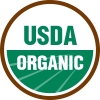Organic Food Advantages
Here's Why It's Worth the Extra Cost
In order to properly address organic food advantages, we need to compare organics to conventionally grown foods.
An easy way to do that it to know what exactly the term "organic" means when it comes to food.
Here are clear, concise, easy-to-understand definitions:

Organic produce must be grown WITHOUT human waste, sewage sludge, chemical pesticides, food additives, and ionizing radiation. They are also not allowed to be genetically modified (no GMO).
Organic meats come from livestock that have not been routinely given antibiotics (they only get them when they are sick) and have never been given growth hormones. They also must be given organic feed.
You see where I'm going with this, right? Conventionally grown food is allowed to be grown with those things I mentioned above. I bet you'll be washing your produce with a little more vigor from now on.
Believe it or not, my point is not to try and gross you out, but to give you a glimpse of how withdrawn we've become from knowing how our food is grown.

I'm not talking about smaller scale farms, but the gigantic ones that stop at nothing to make the biggest profit possible. Without any regard to your health.
After all, why should giant farms:
- Put expensive compost down that will enrich the soil when they can fertilize with inexpensive sewage sludge?
- Worry about growing strong plants that can fend off pests when they can dump pesticides on them?
- Concern themselves with how clean the harvested food is when they can skip the hygiene and nuke it with radiation?
- Produce food that tastes good when they can inject it with chemical additives that have been formulated to taste like the specific food?
These giant farms do everything possible to cut corners and make the biggest buck.
Conventionally-grown food declines in quality and so does the health of the consumer that eats it.
Here are a few big organic food advantages:
- reducing toxins and other substances that depress your immune system and overall health
- ensuring a safer, more nutritious food supply
- cleaning up the environment for future generations
So you see, buying organic food sends a strong message to the giant agribusiness companies.
It says that we care about how our food is grown and prepared.
And it's a win-win for us as consumers.
Because along with telling giant food companies that we want higher-quality food, we also see other great benefits.
Health and Wellness Home - Healthy Food Tips - Organic Food Advantages